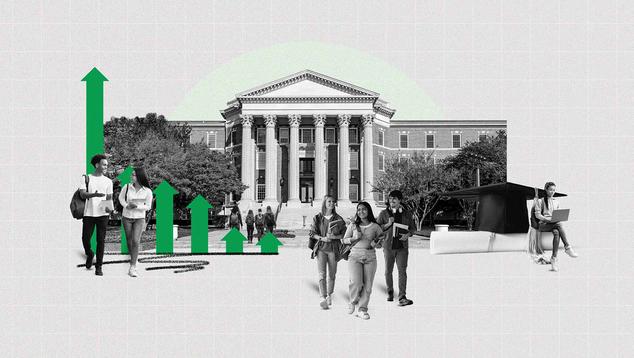WASHINGTON, D.C. — A majority of U.S. parents with a child younger than 18 (59%) say they would prefer their child attend college right after high school, with 40% wanting their child to enroll in a four-year college or university and 19% preferring they go to a two-year or community college. Among other potential postsecondary pathways, 16% prefer their child enter a job training or certification program. Smaller percentages would like their child to join the military (5%) or go straight into the workforce (6%). Most of the rest, 13%, say their child should take time off to figure out their next move.
Results for this Lumina Foundation-Gallup study are based on a Gallup Panel web survey conducted June 2-15, 2025, with a sample of 2,017 U.S. adults aged 18 and older, including 554 parents of children under 18. Parents with more than one child younger than 18 were asked to answer questions about their oldest child who had not yet graduated from high school.
Democrats and College Graduates Most Prefer College Pathway
While six in 10 U.S. parents say they would prefer their child pursue a two- or four-year college education immediately after high school, preferences vary by political affiliation and educational attainment. Democrats (73%) are the most likely to favor a college path, followed by a majority of independents (57%), while less than half of Republicans (48%) say the same.
Just over half of Democrats (53%), compared with 40% of independents and 27% of Republicans, would most like to see their child attend a four-year college. By contrast, there are no meaningful differences among partisans in preferring their child attend a two-year or community college: 21% of Republicans, 20% of Democrats and 17% of independents would choose this option. Meanwhile, Republicans and independents are more likely than Democrats to think their child should enroll in a job training or certification program or go right into the workforce.
Parents who have completed a bachelor’s degree or higher (75%) are far more likely than those who have not (50%) to want their child to enroll in a two- or four-year college. Still, across all major subgroups, pursuing higher education remains the most commonly preferred next step after high school. Parents’ preferences for various pathways are consistent by race/ethnicity and gender but differ markedly by their own educational background. Parents with a bachelor’s degree or higher are nearly twice as likely as those without a college degree (58% vs. 30%, respectively) to want their child to go to a four-year school.
Most U.S. Adults Prefer College Pathway for Youth in Their Lives
The survey asked U.S. adults without a child under age 18 the same question, but in reference to a child they know, such as a nephew, niece, grandchild or family friend who has not yet graduated from high school. Similar to parents, most non-parents say they would prefer the youth in their lives to pursue a college pathway. A combined 55% say they would prefer the child enroll in either a four-year (32%) or two-year (23%) college immediately after graduation. However, non-parents’ preference for a four-year program somewhat lags the rate among parents.
Enrolling in a job training or certification program is the next most favored option among non-parents (23%), compared with 16% of parents who say the same. Relatively few non-parents would prefer the child take time off (12%), join the military (6%) or enter the workforce directly (3%).
Much like the views expressed by parents, non-parents’ preferences differ based on political affiliation and educational attainment. Democrats (60%) and college graduates (63%) are most likely to favor a college pathway, with four-year degrees especially preferred. Republicans and those without a college degree express more mixed preferences, with many favoring two-year colleges or job training programs. Still, across all groups, a college education, whether a two- or four-year degree, remains the most favored next step after high school.
There is some difference by party among non-parents when it comes to preferring a child they know enroll in a job training program. On the other hand, Democratic non-parents are more likely to recommend taking time off, while Republican non-parents are more likely to suggest going straight into the workforce or joining the military.
Bottom Line
Even as public confidence in higher education remains low — with less than half of U.S. adults expressing confidence in colleges and universities — most parents say they would prefer their child pursue a two- or four-year degree immediately after high school. Those without school-age children also lean toward college pathways when asked about the youth in their lives, such as a niece, nephew or grandchild, though slightly less strongly than parents. These preferences persist across political and educational subgroups, including among those without a degree themselves.
Multiple studies consistently find that, on average, individuals with a bachelor’s degree earn $1 million or more over their lifetime than those with only a high school diploma — a reality that may help explain why attending a four-year college remains the most preferred pathway for many families and U.S. adults. Still, higher education institutions face an ongoing challenge in convincing families and students to take on the financial and opportunity costs associated with a degree, as the Lumina Foundation-Gallup State of Higher Education Study continues to show that cost is the most commonly cited reason Americans without a postsecondary credential are not enrolled in a program today.
Learn more about the Lumina Foundation-Gallup 2025 State of Higher Education Study.
Stay up to date with the latest insights by following @Gallup on X and on Instagram.
Learn more about how the Gallup Panel works.





